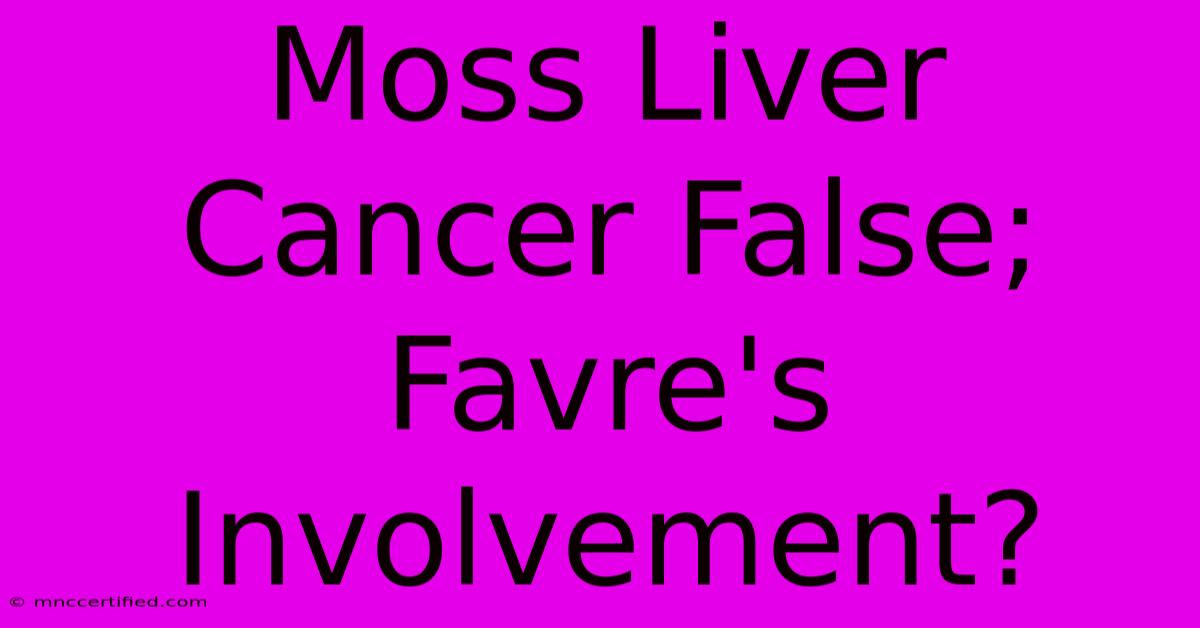Moss Liver Cancer False; Favre's Involvement?

Table of Contents
Mossy Liver Cancer Claim Debunked: Favre's Potential Involvement and the Spread of Misinformation
The recent claim linking Brett Favre to a supposed "mossy liver cancer" causing the death of his friend is completely false and underscores the dangers of misinformation spreading online. This article will debunk the false claim, explore the potential reasons behind its spread, and highlight the importance of verifying information before sharing it.
Understanding the Falsehood: Mossy Liver Cancer Doesn't Exist
The term "mossy liver cancer" is not a recognized medical term. There is no such type of cancer. Liver cancer exists in various forms, including hepatocellular carcinoma (HCC), cholangiocarcinoma, and others, but none are referred to as "mossy liver cancer." The use of this fabricated term immediately signals a potential hoax.
The Dangers of Misinformation
The spread of this false narrative is extremely harmful. It creates unnecessary fear and anxiety, particularly for those already concerned about liver health or cancer. Furthermore, associating a fabricated illness with a prominent figure like Brett Favre lends it an undeserved level of credibility, making it more likely to be believed and shared.
Favre's Potential Involvement: Analyzing the Connections (or Lack Thereof)
While Brett Favre's name has been linked to this false claim, there is currently no credible evidence suggesting his direct involvement in spreading the misinformation or that he played any role in the death described. Claims circulating online should be viewed with extreme skepticism and thoroughly investigated before being accepted as fact.
The Importance of Source Verification
It is crucial to verify information from multiple reliable sources before sharing it. Relying on unverified social media posts, unreliable websites, or hearsay can lead to the widespread dissemination of false information. Reputable news outlets, medical journals, and official government sources are far more reliable sources of information.
Combating the Spread of Misinformation: A Call to Action
We all have a responsibility to combat the spread of misinformation. This includes:
- Fact-checking: Before sharing anything online, take the time to verify its accuracy using reliable sources.
- Critical thinking: Be skeptical of sensational claims, particularly those lacking evidence or credible sources.
- Reporting misinformation: If you encounter false information online, report it to the platform where you found it.
- Promoting media literacy: Encourage others to develop critical thinking skills and learn how to identify reliable sources of information.
Conclusion: Prioritizing Truth and Accuracy
The "mossy liver cancer" claim involving Brett Favre is entirely false and highlights the dangers of misinformation. It is crucial to prioritize truth and accuracy in all online interactions, critically evaluating information before sharing it. By working together to combat the spread of false narratives, we can protect ourselves and others from the harmful effects of misinformation.
Keywords: Mossy liver cancer, Brett Favre, misinformation, fake news, liver cancer, hepatocellular carcinoma, HCC, cholangiocarcinoma, health misinformation, social media, fact-checking, media literacy, reliable sources, debunked, false claim.
SEO Strategies:
- On-Page: Optimized title, headers (H2, H3), meta description, keyword integration throughout the text.
- Off-Page: Promotion on social media (with fact-checking emphasis), outreach to relevant health and news websites, potential guest posting on health blogs. Consider building backlinks to this article from relevant and authoritative websites. The focus should always be on correcting misinformation.

Thank you for visiting our website wich cover about Moss Liver Cancer False; Favre's Involvement?. We hope the information provided has been useful to you. Feel free to contact us if you have any questions or need further assistance. See you next time and dont miss to bookmark.
Featured Posts
-
Kraven Film Review Crowe And Its Flaws
Dec 12, 2024
-
Mayweather On Fan Incident Official Statement
Dec 12, 2024
-
Jim Carrey Returns Needs The Money
Dec 12, 2024
-
Borussia Dortmund Barcelona Live Stream
Dec 12, 2024
-
Nj Drone Sightings Unexplained
Dec 12, 2024